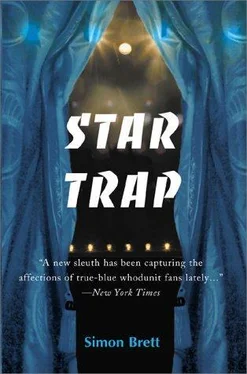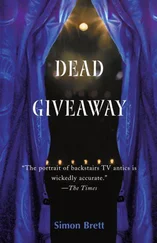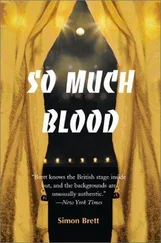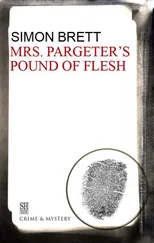Simon Brett - Star Trap
Здесь есть возможность читать онлайн «Simon Brett - Star Trap» весь текст электронной книги совершенно бесплатно (целиком полную версию без сокращений). В некоторых случаях можно слушать аудио, скачать через торрент в формате fb2 и присутствует краткое содержание. Жанр: Классический детектив, на английском языке. Описание произведения, (предисловие) а так же отзывы посетителей доступны на портале библиотеки ЛибКат.
- Название:Star Trap
- Автор:
- Жанр:
- Год:неизвестен
- ISBN:нет данных
- Рейтинг книги:5 / 5. Голосов: 1
-
Избранное:Добавить в избранное
- Отзывы:
-
Ваша оценка:
- 100
- 1
- 2
- 3
- 4
- 5
Star Trap: краткое содержание, описание и аннотация
Предлагаем к чтению аннотацию, описание, краткое содержание или предисловие (зависит от того, что написал сам автор книги «Star Trap»). Если вы не нашли необходимую информацию о книге — напишите в комментариях, мы постараемся отыскать её.
Star Trap — читать онлайн бесплатно полную книгу (весь текст) целиком
Ниже представлен текст книги, разбитый по страницам. Система сохранения места последней прочитанной страницы, позволяет с удобством читать онлайн бесплатно книгу «Star Trap», без необходимости каждый раз заново искать на чём Вы остановились. Поставьте закладку, и сможете в любой момент перейти на страницу, на которой закончили чтение.
Интервал:
Закладка:
Two untimely candles added to the stuffy atmosphere of Italian Catholicism which the room generated. Every surface was crowded with souvenirs, more tiny framed photographs, dolls, masks, gloves, programmes, massed untidily like offerings before a shrine.
The votaress sank dramatically into a small velvet chair and lay back so that the candle-light played gently over her fine profile. It reminded Charles of Spotlight photographs of ten years before, when every actor and actress was captured in a fuzzy light which picked out their bones in a murk of deepening shadows. (Nowadays actors tend to be photographed as if they’ve just come off a building site or are about to start life sentences for rape.) ‘Well,’ she said, ‘you want to ask me about Christopher.’
She didn’t ask for any credentials, which was a relief, because Charles hadn’t thought through the details of what Alfred Bostock was meant to be researching.
‘Yes, I’m after a bit of background, you know, what was he like as a child?’ Charles mentally practised his Alfred Bostock voice by repeating ‘Ford Cortina’, ‘double glazing’ and ‘ceiling tiles’ to himself.
‘Christopher came to me when he was ten.’ Ellen da Costa settled down to her recitation from Lives of the Saints. ‘Just a scrap of a boy, but with that same appealing charm and, of course, the talent. Even then, when he was unformed, the talent was there. Quite exceptional. His parents had died, in a car crash, I think, and it was an aunt who brought him to me. Very self-possessed he was.’
‘When was this that he first came to you?’
Ellen da Costa gave him a look for talking in prayers, but she answered his question, revealing that she had not been in on the shedding of four years considered necessary to the star’s career.
She then continued at some length describing the evolution of the embryo talent under the ideal laboratory conditions of her school. Charles was beginning to feel sated with superlatives when she offered to illustrate her lecture with a collection of press cuttings pasted into large blue ledgers.
They weren’t very revealing. One or two good notices for the young Christopher Milton, but nothing which suggested a performer set to take the world by storm. Charles mentioned this to Ellen da Costa in suitably reverential tones.
‘Ah well, the press has never been notorious for its recognition of true quality, particularly in the theatre. I once knew an actor.. ’ the pause was deliberately left long to summon up images of years of wild passion. ‘… a very great actor, who was nearly crucified by the critics. It was a martyrdom, a true martyrdom, very triste. Pardon my speaking so of your chosen occupation — ’ for a moment Charles couldn’t think what she was talking about — ‘but in my experience the press has never, in this country anyway, had the delicatesse to understand the workings of genius.’
Charles did not attempt to defend his assumed calling, but murmured something suitable. ‘Also,’ she continued, her finely modulated voice drawing out the final ‘o’ almost to breaking point, ‘perhaps Christopher was not fully realised at first. The potential was there, massive potential. Of course, with my experience I could see that, I was sympathique to it, but it was slow to blossom. At first there were others who appeared more talented than he, certainly who attracted more public notice, more press reaction, more work.’
‘They worked while they were here?’
She at once became guarded, as if this were a patch of coals over which she had been hauled before. ‘Most stage schools also act as agencies for child performers and a lot of our pupils do a great deal of work, subject of course to the legal restrictions of only working forty days in the year and with adequate breaks. All the children are chaperoned and — ’
But Charles was not writing a muck-raking article on the exploitation of child actors, so he tactfully cut her short, and asked if she would show him some of the early photographs of Christopher Milton.
She obliged readily. ‘Here are some from 1952.’ They looked very dated. Styles of period stage costume change quite as much as current fashion and the starched ruffs and heavy Elizabethan garments the children wore had the same distant unreal quality as Victorian pornography. ‘This is from a production of Much Ado my students did. Christopher was playing Claudio.’
Charles took the photograph she proffered. Christopher Milton’s face was instantly recognisable, even under a jewelled and feathered hat. All twenty-three years had done was to cut the creases deeper into his skin.
But it was the other two children who intrigued Charles. They were beautiful. Their grace in the heavy costumes made them look like figures from an Elizabethan painting and showed up Christopher Milton as very twentieth century, almost gauche in doublet and hose. The girl had a perfect heart-shaped face and long-lashed eyes whose grave stare, even from the old photograph, was strongly sensual. She appeared to be looking at the boy, who returned her gaze with the same kind of intensity. He had the epicene grace which some adolescent boys capture before they coarsen into adults. The face was almost baby-like in its frame of long blond curls. The eyes were deep-set and powerful.
‘Claudio,’ Charles repeated after a long pause. ‘That’s not the best part in the play. Presumably this young man played Benedict?’
‘Yes.’
‘Was he good?’
‘Yes, he was very good. He did a lot of film work in his teens. Gareth Warden, do you remember the name?’
‘It rings a bell.’ Yes, Julian Paddon had mentioned it and, now he saw the photograph, Charles realised that Gareth Warden had been in the film he’d caught the tail-end of on Jim Waldeman’s television. That seemed so long ago it was like a memory from a previous incarnation. ‘And the girl?’
‘Prudence Carr. She was a clever little actress, so clever.’
‘And she played Beatrice?’
‘Yes.’
‘Any idea what happened to her? Or to Gareth Warden, come to that?’
‘I don’t know, Mr Bostock. The theatre brings its share of heartbreaks to everyone who is involved in it.’ She gave a long sigh, which was a good demonstration of the breath control so vital for elocution and which was also meant to imply a lifetime of theatrical heartbreaks. ‘Neither of them did much so far as I know. Dear Garry had the misfortune of early success. It’s so difficult for them to make the transition from playing child parts to adult ones. As you see, he was a beautiful boy. Perhaps he lost his looks as he got older. Perhaps he decided the theatre was not the career he wanted. Je no sais pas. He hasn’t kept in touch at all.’
‘And the girl?’
‘The same story. I haven’t seen her since she left my care. Maybe she didn’t go into the theatre.’
‘She should have done. With looks like that. And if she could act as well as you say.’
‘Ah, she was magic. But things change. Fate takes a hand. Maybe she settled down and got married. How many promising careers have been cut short by matrimony. And how many only started by the failure of matrimony,’ she added mysteriously with a suffering gaze out of the window to some distant memory. ‘But c’est la vie. Some rise and some fall. Of those three, all the same age, all so talented, one was chosen, one who was more talented, one who had the real magic of stardom, and that was dear Christopher. He triumphed and left his rivals standing.’
With recent knowledge of Christopher Milton’s methods of leaving his rivals standing, Charles wondered if there was some story from the past which might show a parallel. ‘Presumably, Miss da Costa, with three students who were so talented in the same area, there must have been moments of jealousy between them?’ he probed.
Читать дальшеИнтервал:
Закладка:
Похожие книги на «Star Trap»
Представляем Вашему вниманию похожие книги на «Star Trap» списком для выбора. Мы отобрали схожую по названию и смыслу литературу в надежде предоставить читателям больше вариантов отыскать новые, интересные, ещё непрочитанные произведения.
Обсуждение, отзывы о книге «Star Trap» и просто собственные мнения читателей. Оставьте ваши комментарии, напишите, что Вы думаете о произведении, его смысле или главных героях. Укажите что конкретно понравилось, а что нет, и почему Вы так считаете.












